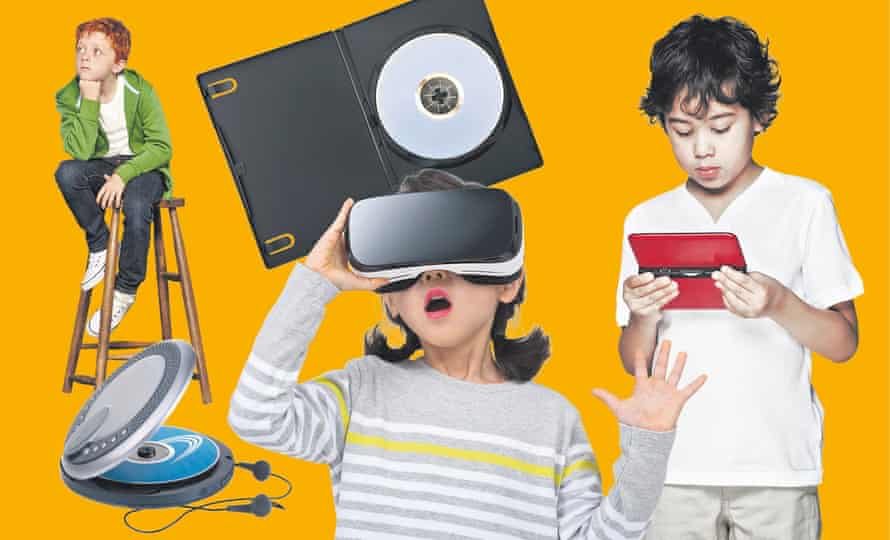Waldorf News
What does tech take from us? Meet the writer who has counted 100 big losses

Interview by John Harris
‘My default is opting out’ … Pamela Paul at home in Westchester County, New York. Photograph: Richard Beaven/The Guardian
We have never been more reliant on the internet – yet Pamela Paul still gets DVDs in the post and buys CD players. Why? Because we have lost more to the digital era than we realise, she says
Pamela Paul must be one of the last subscribers to the branch of Netflix that allows its users to see films via the stone-age practice of receiving DVDs in the post. I know this because, two days after we talk, she sends me a blurry photograph of her last hire – The Anniversary Party, a 2001 comedy starring Gwyneth Paltrow, Jennifer Jason Leigh and Alan Cumming – along with a Q&A she did for the New York Times, about the art of what she calls “sliding backward on tech”. Its basic point is summarised in one of Paul’s characteristic bits of aphoristic wisdom: “In general, when I hear the phrase ‘There’s an app for that’, my first question is: ‘Does there need to be?’”
Paul, 50, is the editor of the New York Times Book Review. She does not use any streaming services. As late as 2019, she bought – read this slowly – portable CD players for two of her children. As a matter of principle, she refuses to own or use anything resembling a tablet, except her phone. “I don’t want a tablet,” she says, her face adopting an expression of mild disgust. “People have tried to give me a tablet; I want nothing to do with that tablet. I would probably have to be paid a salary of, like, $250,000 a year to use a Kindle or an iPad to read on. It would be that unpleasant.”

This is not quite the expression of luddite fundamentalism it might seem. Paul’s professional life is just as tech-heavy as most other people’s. She says her working hours are “a cascade of Zooms”, while her fairly prolific tweeting is not suggestive of someone who lives in a cave. But she does maintain a personal existence partly rooted in the pre-internet age. Moreover, she is old enough – like me – to recall clearly what life was like in those far-off times, and to feel a nagging sense of loss about what the online world has rendered useless and irrelevant.
“When I hear the phrase ‘There’s an app for that’,
my first question is: ‘Does there need to be?”
This is the context for her latest book, 100 Things We’ve Lost to the Internet. Its form seems to fit an era of short attention spans, breaking up its author’s writing into short essays with headings such as “Solitude”, “Ignoring people”, “Leaving a message” and “A parent’s undivided attention”. At its best, the book reads like it mixes journalism with sociology and anthropology. To its credit, it also manages the rare feat of exploring what technology has done to us without succumbing to doom and panic.
We talk for an hour on a video call and one thing quickly becomes clear: Paul is the kind of freewheeling conversationalist who was always going to feel a little adrift in a world of one-line texts, emojis and the disappearance of the long, digressive phone conversation. “There are a lot of terrible things to say about the internet,” she says. “What I wanted to focus on was not so much all of those doomsday scenarios, although they exist, but to look at all of these forces and say: ‘What does this mean for what we do in our daily lives – from the moment we wake up to the iPhone alarm to the moment when we’re trying to fall asleep at night and we can’t because we’re like: ‘Oh my God, there’s this newsletter that arrives at 11pm, let me just see what it says’? What does it actually mean down here at the level of how we live?”
Paul has been an author for nearly 20 years, specialising in what she calls “the intersection of consumer culture and real life”. Her first book, published in 2002, was about what she called “starter marriages” – the trend for many people’s first experience of matrimony to be short and childless – and how this was partly traceable to the massive wedding industry. Three years later came a prescient work titled Pornified, which focused on one of the internet’s most pernicious aspects; it was subtitled “How pornography is transforming our lives, our relationships and our families”. Parenting Inc, from 2008, was about the consumerisation of raising kids. By way of offering an antidote of some kind, her 2019 book How To Raise a Reader – written with her NYT colleague Maria Russo – was a straightforward guide to pulling children away from screens and encouraging the declining habit of getting immersed in books.
100 Things draws on themes that have run through a lot of her work. It applies an appealing humour and light touch, and tells a vivid story: how, in little more than 20 years, we have shed ingrained social and behavioural habits, as well as some of the most basic ways we once thought of ourselves and our relationships with others. If they are minded to read it, anyone under 40 will presumably understand the book as the evocation of a strange, slow, endlessly inconvenient reality that now feels almost exotic. For anyone older, it will deliver a sense of loss – and of being old enough to remember times that seem almost hilariously distant.
One of Paul’s talents is the ability to see big change in lots of small ones. She writes about the end of talking to strangers on aeroplanes; the increasingly lost human habit of staring out of windows; and why no one bothers to remember phone numbers any more.

‘Boredom serves a function… your brain wanders and you think about things.’
In one particularly ingenious entry, she explains the demise of the full stop (or, in American English, the “period”). If you have ever wondered why putting such once-crucial punctation in emails, phone messages or tweets now feels so awkward, here is the answer: “The period can feel so emphatic as to sound sarcastic, the internet’s version of ‘puh-leeze’ and ‘no, thank you’ and ‘srsly’ rolled into one tiny dot.” It can easily come across as passive-aggressive. Exclamation marks, moreover, “now convey warmth and sincerity”; failing to use them runs the risk of making the person you are messaging feel uncertain and anxious.
Such small transformations, Paul explains, arrive without warning and magnify a sense of everything being in flux. For fear of becoming social outcasts, most people feel they have little option but to try frantically to keep up.
On the day we speak, Mark Zuckerberg has just announced the rebranding of Facebook’s holding company as Meta and premiered the virtual reality hellscape the company is calling the metaverse. “We are all desperately trying to stay on top of things,” says Paul. “Right now, we’re going to have to be on top of the metaverse or we’ll have to opt out of it altogether. But we’re constantly moving forward: ‘Should I do this thing? How come I don’t know about that app? I haven’t adopted it.’
“What we never do is take a step back and say: ‘Wait a minute – what did we use to do here? How did this use to work?’ And what’s crazy is we’ve become so quickly habituated. We’ve adopted all these new habits and completely forgotten how we used to get around – literally, how we used to get around. How did we do it when we didn’t have GPS? Oh yeah, we used to have those huge fold-out maps that you could never fold back properly. But we’ve forgotten that. No one uses those any more. And no one knows how to get anywhere without a device.”
Recently, she read a century-old book by the US novelist Edith Wharton, A Motor-Flight Through France, which was written partly as an exploration of how much human existence had been changed by the invention of the car. “That was occasion enough to write an entirely new travelogue about a country she’d written about before – because suddenly you were no longer beholden to trains and so you could go down different routes and you didn’t have to rely on a schedule. And now, you just think about the tininess of that change, really, relative to the ways in which everything has altered in the last 20 years. That was considered to be a monumental shift. But it’s nothing compared with what we’ve been through in the last 20 years.”
A key part of the internet’s behavioural and psychological revolution is the subject of the book’s opening entry: boredom, the decline of which has radically altered childhood (as any parent will know). “Only a few short decades ago, during the lost age of underparenting, grownups thought a certain amount of boredom was appropriate, even to be encouraged, because it forced kids to exercise their imagination and ingenuity,” Paul writes. “A little ennui would make a person less bored in the long run.”
“Boredom serves a function,” she says now. “It’s boring, obviously, and we don’t like that, but, when you have no input coming in, you generate output. That’s how you become resourceful. But now you constantly have access to information, entertainment, distraction – all of this stuff coming in, coming in and coming in. And it doesn’t allow you the empty space to create something, or to just process something.
“I spent so much time in the back seat of my parents’ car bored out of my skull. There was nothing to do. Then your brain wanders and you think about things. Now, every kid in the car has their own device and they’re listening to their own music or their own audiobook or their own podcasts, or they’re playing a video game or they’re swiping through social media, or they’re taking a million and one pictures of themselves and snapping them up to Snapchat. I don’t know why. How many times can you look at people’s faces?”
In a roundabout way, this brings us to something that the book explores a lot: the sense that most of us live in front of a constant audience, with few benefits to show for it. “I feel like what’s happened is that everyone is living the emotional lives of famous people, constantly needing to react to this world that is so much larger than the actual human world that they otherwise would be inhabiting. And I think that is really emotionally and psychologically hard to handle, in the same way that it’s hard to handle for a celebrity. They’re lucky that they get to be rich and probably beautiful on top of that and have lots of privileges. But most of us, frankly, don’t.”
Paul’s book is not quite the endless lament our conversation suggests. Some of its entries are full of ambivalence: being able to “Google the hell out of someone” in advance of a blind date might rob the occasion of its mystery, but it is surely all to the good; the modern impossibility of getting lost might sometimes mean that we don’t “succumb to chance and make our own discoveries”, but it has its upsides. There is also material about things surely no one will miss: chequebooks, old-school encyclopedias, the Filofax (note to younger readers: ask your parents).
Nonetheless, her most poignant, thought-provoking points are about things we should not throw overboard with the enthusiasm that the tech industry wants us to – and, by implication, about the necessity of what she calls “microrebellions”. Besides her CD players and rented DVDs, there is another obvious example.
“Well, look here,” she says. She pulls her computer to her left and my screen is filled with the image of thousands of books.
She thinks for a moment. “Do you know what the way I think about all this is? I am highly technological in my day job, because I have to be. And then, in my personal life, rather than the default being opt-in, my default is opting out. I will only adopt something if I really think it’s going to improve my life in some substantial way.”
Here, perhaps, is a modern paradox. We embrace the internet because it seems to hugely increase our autonomy, but the online world soon gives us the sense that, when it comes to what it offers us, we have no meaningful choices at all. The only thing to do is to drop the old, embrace the new and live with the consequences.
“We have the option to say: I don’t want that product,” says Paul. “I don’t actually have to pay by [the mobile payment service] Venmo. I don’t need PayPal. I don’t have to get my books from an online retailer. There are other ways of doing these things. It’s a choice. Buying or not buying a pair of jeans or a new skin cream – those are all options, too. And yet, for some reason, with technology, we forget that we have control.”
100 Things We’ve Lost to the Internet by Pamela Paul is available in local bookstores everywhere or here.
 Waldorf Stories for Everyone
Waldorf Stories for Everyone Everything a Teacher Needs
Everything a Teacher Needs Bay Area Teacher Training
Bay Area Teacher Training ~ Ensoul Your World With Color ~
~ Ensoul Your World With Color ~ Training in Traumatology & Artistic Therapies
Training in Traumatology & Artistic Therapies Great books for Waldorf Teachers & Families
Great books for Waldorf Teachers & Families The Journey is Everything
The Journey is Everything Roadmap to Literacy Books & Courses
Roadmap to Literacy Books & Courses Middle School Science With Roberto Trostli
Middle School Science With Roberto Trostli Flexible preparation for your new grade
Flexible preparation for your new grade Space speaks. Its language is movement.
Space speaks. Its language is movement. Immersive Academics and Arts
Immersive Academics and Arts Grade Level Training in Southern California
Grade Level Training in Southern California Transforming Voices Worldwide
Transforming Voices Worldwide Association for a Healing Education
Association for a Healing Education Waldorf-inspired Homeschool Curriculum
Waldorf-inspired Homeschool Curriculum Grade-specific web courses for teachers
Grade-specific web courses for teachers Quality Education in the Heartland
Quality Education in the Heartland Summer Programs - Culminating Class Trips
Summer Programs - Culminating Class Trips Waldorf Training in Australia
Waldorf Training in Australia Full-Time Teacher Education
Full-Time Teacher Education Jamie York Books, Resources, Workshops
Jamie York Books, Resources, Workshops Caring for All Stages of Life
Caring for All Stages of Life Preparing Teachers for 2024-25 Grades 1-8
Preparing Teachers for 2024-25 Grades 1-8 Train to Teach in Seattle
Train to Teach in Seattle Bringing Love to Learning for a Lifetime
Bringing Love to Learning for a Lifetime RSS Feeds
RSS Feeds